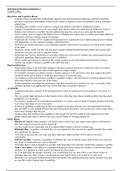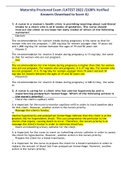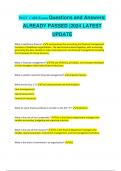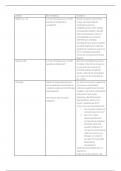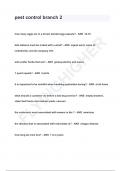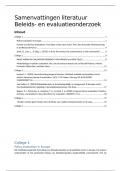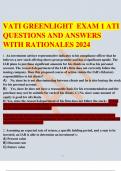Cognitive Bias
Heuristics and Cognitive Biases
- Cognitive biases include that of attentional, approach and interpretational tendencies, and these automatic
processes could cause individuals to attend more readily to stimulus in their environment, such as substance
related cues.
- Attending more readily to cues results in a relapse into addictive disorder or heightened anxiety.
- Cognitive Explanations focus on the way people think about a behaviour rather than the behaviour itself; if
humans were rational we wouldn’t become addicted because the costs always outweigh the benefits.
- Thus, it makes sense to suggest that human errors in thinking can explain why we initiate potentially addictive
behaviours and then continue despite the damage.
- Kahneman and Tversky (1973): proposed that humans have a particular way of approaching decision making
and judgements- we have adopted strategies called heuristics.
- Heuristics are mental shortcuts to solve problems and they often involve focusing on one thing at the expense
of the other.
- Heuristics can be useful, but they can also lead to people making harmful decisions rather than logical ones
and in this case they can lead to cognitive biases.
- Kahneman and Tversky identified two heuristics which have been used to explain why some people become
addicted to gambling; Representativeness and Availability.
- When a particular heuristic is chosen on the wrong occasion it can cause behavioural problems and may
explain why people continue to gamble even when they lose.
Representativeness
- Representativeness is the belief that random events have a pattern and that in a particular series of events a
small sample should represent what would happen in a larger sample.
- For example, if people are asked to create a random sequence of 20 coin-tosses, they may suggest the ration
should be 50/50, but in reality it could take many throws to reach that ratio.
- An example of when this becomes a problem is gambler’s fallacy: the belief that if something happens more
often than normal it will occur less in the future.
- Problem gamblers may adopt the problematic view that once they have lost they are ‘due’ a win and so they
continue, perhaps even upping their bets if they think they can predict outcomes.
Availability
- Availability heuristic is based on the principle that an event is considered to be more likely if it is easier to
recall.
- The way people make decisions is often based on how often they hear about something rather than the actual
probability of it occurring.
- For instance, people will overestimate the probability of a certain cause of death if a family member died from
it or if they hear about it a lot in the news.
- In terms of gambling, people may be driven to gamble on the basis that they have the unfounded belief that
they are likely to win, perhaps because they have heard about big lottery wins on the news which makes them
seem more common than they are.
- Casinos place slot machines close together so that people can hear the sound of coins rolling out for other
people which leads them to believe they have a good chance of winning themselves.
Other Biases
- Illusion of Control: Many gamblers will falsely believe that if they can control some aspects of the process
then their chances of success will be improved.
- e.g. they might sit on a particular seat at a roulette table or throw a dice in a certain way.
- Hindsight Bias: A gambler will claim they are not surprised by the outcome of a gamble and that they could
have predicted the outcome.
- This helps to maintain the view that once their skills have improved they will be able to win more
consistently.
- Self-Serving Bias: Tendency of gamblers to attribute any wins to internal causes such as their own skill and
any losses to external factors, such as bad luck.
- This helps them to feel as though it is not their fault when they loose and they should thus continue to gamble.
- Sunk-Cost Fallacy: This fallacy is a decision-making bias which reflects the tendency to invest more future
resources in a situation in which a prior investment has been made.
- So, if an individual has already ‘invested’ a lot in gambling, they are more likely to put future money in
gambling than into other avenues even though the most logical thing to do would be to walk away.
- McGrath et al: Eye-gaze tracking showed that individuals with gambling disorders tend to attend to cues that
are specific to their original type of gambling.


